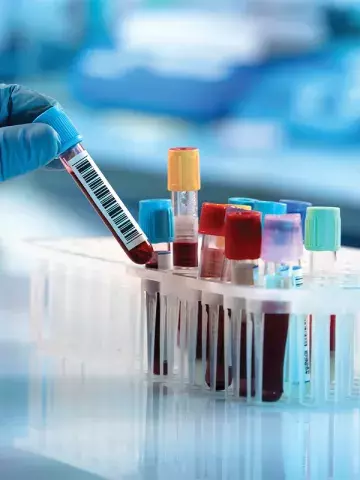Commonly requested blood tests could improve cancer detection
By Rebecca Jenkins
Abnormal results from commonly requested general practice blood tests could help to determine which patients presenting with nonspecific symptoms are most likely to have cancer, two studies have found.
In the first study, published in Cancer Medicine, researchers used linked Australian primary care and hospital cancer registry data to conduct a cohort study of 855 patients with lung cancer (LC) and 399 with colorectal cancer (CRC) diagnosed between 2001 and 2021.
The researchers found general practice blood test requests increased from seven months before CRC was diagnosed and six months before LC was diagnosed.
‘Abnormalities in many APR [acute phase reactants] and RBCI [red blood cell indices] increase several months before cancer diagnosis, often occur prior to or in the absence of anaemia, and are different in LC and CRC patients,’ the researchers reported.
In the second study, published in PLOS Medicine, researchers used linked UK primary care data to conduct a cohort study of 477,870 patients aged 30 years and older presenting with new abdominal pain or bloating. They used the data to calculate the positive predictive value of 19 abnormal blood test results for detecting cancer by age and sex.
The researchers found males and females aged 60 years and older presenting with either symptom had a risk of underlying cancer exceeding the 3% threshold used by the UK’s National Institute for Health and Care Excellence for recommending urgent cancer referral.
In patients aged 30 to 59 years with abdominal pain or bloating, certain blood abnormalities strongly predicted the risk of any undiagnosed cancer; these included anaemia, low albumin, raised platelets, abnormal ferritin and raised inflammatory markers.
‘In many age-sex strata, the presence of these abnormalities raised the probability of undiagnosed cancer to above 3%,’ the researchers wrote.
Lead author of both studies Dr Meena Rafiq, academic GP and Clinical Research Fellow at the Department of General Practice and Primary Care at the University of Melbourne, Melbourne, said almost all patients with cancer will first see their GP with symptoms and half of these patients will have vague, nonspecific symptoms.
‘Many patients who consult their GP with symptoms are already having blood tests done. This research will help GPs to interpret and utilise the wealth of information already available in existing test results to improve cancer diagnosis,’ she told Medicine Today.
Dr Rafiq, who is also a Clinical Research Fellow at University College London, UK, said it was hoped a tool could be developed that could be integrated into existing GP computer systems and assess cancer risk based on multiple variables.
Cancer Med 2024; 13: e70006. https://doi.org/10.1002/ cam4.70006 and PLOS Med 2024; https://doi.org/10.1371/journal.pmed. 1004426.


